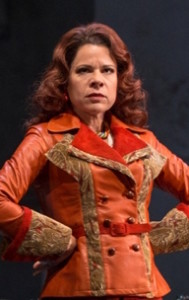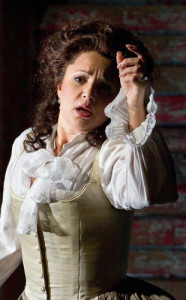The female characters and gender issues in the Mozart/Da Ponte operas deserve to be explored from every angle. It can be debated for eternity whether Cosí Fan Tutte is really as misogynistic as it pretends to be, whether or not the proto-feminism of Figaro is undermined by the Countess’s forgiving her unworthy husband, whether or not the three women of Don Giovanni exist to earn sympathy or to be mocked, whether Mozart’s music gives the female characters more depth and intelligence than the males or stereotypes and “others” them, and, if the former is true, whether his music transcends Da Ponte’s misogyny or whether Da Ponte likewise sides with the ladies. This doesn’t even apply to the Da Ponte operas alone – discussing The Magic Flute‘s gender issues opens a massive can of worms! Just to scratch the surface of an incredibly rich topic, I’d like to discuss one of Don Giovanni‘s women: Donna Elvira.
Even though commentators often hail Elvira as the opera’s most moving character, feminists have hardly viewed her as unproblematic. A recurring theme in writings I’ve read about the character is that our compassion for her is largely due to modern sensibilities – that in Mozart’s day she would have been viewed as a silly comic figure, reflecting a misogynistic disdain for seduced and abandoned women. Even with modern sensibilities, it’s impossible to deny the comic element in her; no matter how seriously she’s characterized (for example, Lisa della Casa’s oh-so-ladylike portrayal of her in the filmed 1954 Salzburg production), it’s hard not to smirk when she sings of tearing out the Don’s heart, or when she repeatedly appears out of nowhere to try to thwart his exploits, or when she falls obliviously into the disguised Leporello’s arms. The very fact that an aristocratic lady should go storming around the countryside seeking revenge on a man was probably smirk-worthy to an 18th century audience. According to some critics, the fact that she’s even partially a comic figure is a classic sign of 18th century sexism.
So is it possible for a contemporary, feminist-minded person to fully enjoy her as a character?
Anyone looking for a role model in her can only be disappointed. She fails at almost everything. Her quest for revenge fails, first because of Giovanni’s elusiveness, but ultimately because she’s too much in love with him. Her belief in Act II that her love has changed him and won him back is a total delusion – not only is it a trick and an impossibility, it’s not even the real Don, but an imposter! And while her character arc has often been viewed as a journey from vengeful rage to selfless, caring forgiveness, the fact is that she fails at being selfless and forgiving too. When the Don responds to her compassion with mockery, she all too quickly storms off screaming “Stay then, barbarian, in your stinking filth, a horrendous example of iniquity!” and when she reappears with the others for the finale, she’s once again baying for revenge. This is especially apparent in the opera’s original Prague edition, which lacks the aria “Mi tradí” with its added emphasis on her compassion.
That said, I have no patience for commentators who claim that “Mi tradí” is “out of place” or “out of character.” It’s an excellent aria that adds both a vocal showcase and more humanity and heart to her role. The claim I’ve read that it’s “too passive” – that it portrays her as meekly giving in to her tender feelings for Giovanni, while an “in-character” Elvira would fight tooth and nail to resist them – is, in my humble opinion, nonsense. Just listen to the swirling, swooping vocal line! Does that sound like “passive” music? Whether or not Da Ponte’s text implies a tumultuous inner struggle between rage and compassion, Mozart certainly does!
Complicating the issue of how to view her is the sheer moral ambiguity of both her anger and her forgiveness. On the one hand, Giovanni proves himself again and again to be unworthy of forgiveness, and his punishment is the ultimate crux of the opera – its very alternate title is Il disoluto punito, and by the end of the first act alone, every character except Leporello is seeking revenge on him. Besides, from a feminist standpoint, it’s hard not to admire a woman who defies her era’s conventions and journeys alone across Spain to bring the man who betrayed her to justice, even if there is a comic element to it, and it’s natural to be disappointed when she lets him seduce her again. Especially since she capitulates knowing he’s betrayed hundreds of other women too, knowing he killed the Commendatore, and having witnessed his attempt to rape Zerlina. But on the other hand, it’s hard to unabashedly view revenge as right and forgiveness as wrong, especially since the value of forgiveness is a recurring theme in so many of Mozart’s other operas: Flute, Cosí, Entführung, Idomeneo, Clemenza di Tito, and of course, Figaro. How, so soon after portraying the Countess’s forgiveness of her husband in such a moving, positive light in Figaro (though even there, as I mentioned, it’s been a point of some controversy among critics), could Mozart and Da Ponte have possibly wanted us to view Elvira’s forgiveness in a fully negative light? And after she reaches the pinnacle of selfless love and compassion, not caring whether or not Giovanni comes back to her but begging him to change his ways to save himself from damnation, how can we not feel a pang of disappointment when she so quickly withdraws her forgiveness and leaves him to his fate in disgust?
What to make of this conflicted, tragicomic woman who has so much fire yet so much fragility and who makes valiant efforts but fails miserably both at righteous retribution and at saintly love?
I don’t think there are many definitive answers concerning her. Different singers have interpreted her in so many ways: from raging firebrands like Elisabeth Schwarzkopf or Cecilia Bartoli to sadder, more pathetic figures like Anne Murray or Mireille Delunsch, from serious figures like Lisa della Casa to broadly comic ones like Solveig Kringelborn, and more. Even her age is never specified: she’s been convincingly played as a young girl, an “old maid,” and everything in between. And the possible implications of her ultimate choice to enter a convent are widely varied. Is it because she’s “disgraced” and “unmarriageable”? Because her misadventures have soured her toward men? Because no man will ever measure up to Giovanni? Because she hopes to find healing through religion? Because she hopes her prayers for Giovanni will end his punishment? Or all of the above?
Even the nature of her past with Giovanni can be debated. Most commentators take it for granted that they had out-of-wedlock sex and that her line “You declared me your bride” only means that he promised to marry her. But from what I’ve read, in Moliere’s play Don Juan – which first introduced the figure of Elvira into the Don Juan myth – he actually did marry her, and nothing implies otherwise in the opera’s libretto. She calls him her sposo and marito, declares that he defied “the sacred laws of earth and heaven” by leaving her, and never refers to herself as having sinned, nor does anyone else claim she did.
But one thing is certain: until I read certain commentaries about her, it never even occurred to me to think of Elvira as a misogynistic creation.
Is she the only character in the opera whom Giovanni makes a fool of? Certainly not! Is she the only character who sees his sins and is disgusted, but stays hopelessly attached to him anyway? No! There’s also Leporello! Is she the only character who blusters and rages at an unfaithful lover, only to fall back into his/her arms all too easily? No! There’s also Masetto! Is she the only one whose mission to punish the Don fails miserably? No! Everyone fails in that regard except the Commendatore’s ghost! It seems to me that Mozart and Da Ponte were less mocking women than mocking people in general. And I’ve never seen her comic aspects as implying that either Mozart or Da Ponte lacked sympathy for her. Isn’t it possible to chuckle at her melodramatics and foibles, but still fully recognize that her pain is real and that what the Don does to her is wrong? Within the opera itself, look at Leporello: he repeatedly expresses pity for her and revulsion at the Don’s treatment of her, even though he also sometimes mocks her (and of course takes part in toying with her, though that’s under duress).
Nor do I think Mozart and Da Ponte meant for her to be a goofily psychotic “hysterical woman.” Donna Anna and Don Ottavio’s first response to meeting her is to be impressed by the nobility and sweetness of her bearing. (Sopranos, take note!) When Giovanni tells them she’s insane, Anna remarks that there’s no sign of madness in either her face or her speech. Why so many opera lovers ignore those passages and blindly label her a “madwoman” I don’t know. I suppose it’s because the stronger memory is of her entrance aria, where she sings about brutally murdering Giovanni… but even though some directors like Peter Sellars or Francesca Zambello have her actually wielding a knife or a shotgun, those lines can easily be read as just a fantasy on her part, not a real statement of intent. She never actually tries to kill him: her revenge that we see in action is just to expose his crimes, destroy his good name and keep him from preying on any more women. Nor should she spend all of Act I as a raging battleax with seemingly no vulnerability, whose capitulation to Giovanni in Act II is a complete, comical about-face. After her noble bearing, the next two things Anna and Ottavio notice are her pallor and tears, which, combined with said noble bearing, instantly earn their sympathy.
Though scholars might disagree with me – Mozart and Da Ponte themselves might have disagreed with me – I’d like to argue that in a way, Donna Elvira might be one of the most feminist characters in the standard operatic repertoire. So often not only in opera, but in all types of fiction written by men in past centuries, women are either shamed and vilified, or, more often, idealized and put on a pedestal. Fully human, complex female characters can be hard to find. Yet in Elvira, we find one. A female character with both comic and tragic elements; who has genuine dignity yet makes a fool of herself; who’s no shrinking violet, but no pillar of strength either; who has blazing anger, but too much love to maintain it, and great capacity for compassion, but too much anger to maintain it; whose faithful, passionate love has both positive and negative effects; whose humiliations are sometimes played for laughs but never portrayed as justified; and who remains morally gray throughout the opera, with neither the other characters nor the creators ever judging her. In short, she’s a likable yet flawed, three-dimensional person. For the feminist opera lover, that’s worth appreciating.





